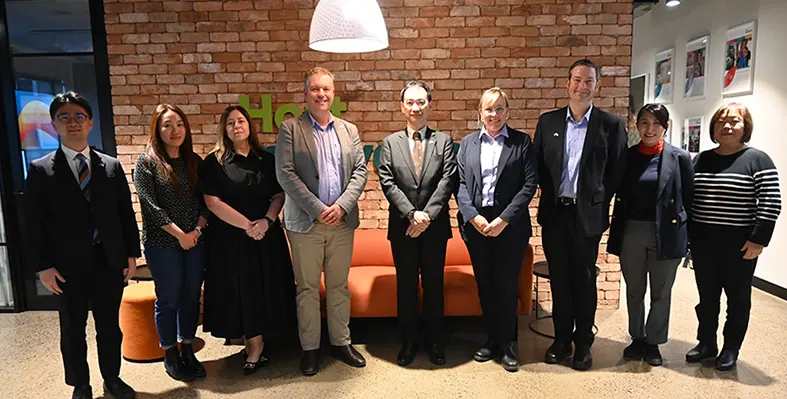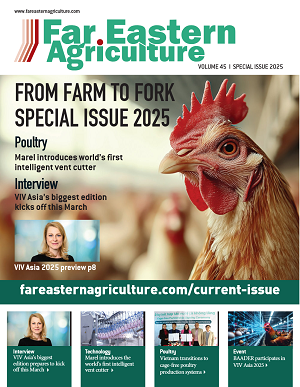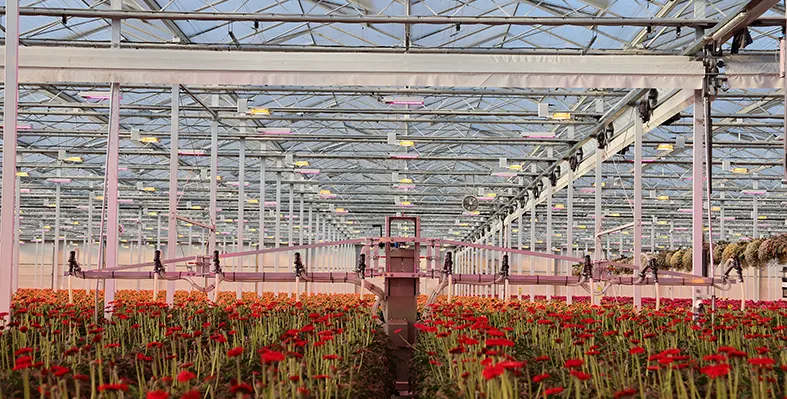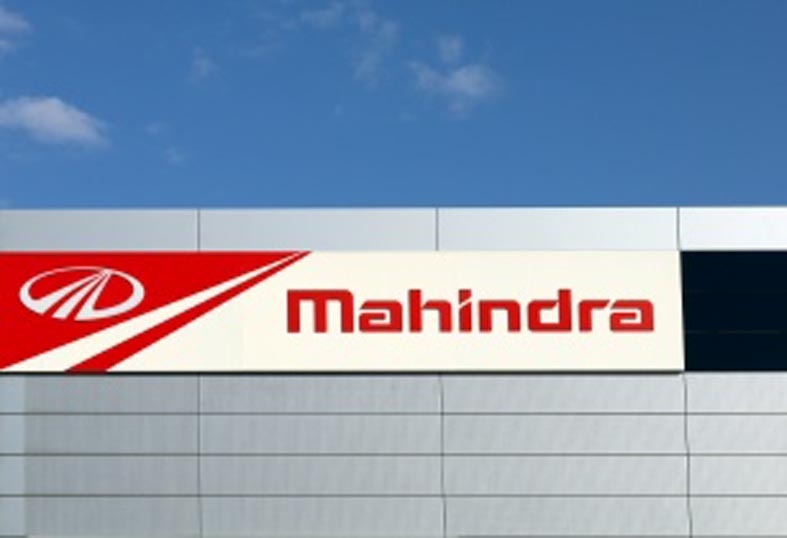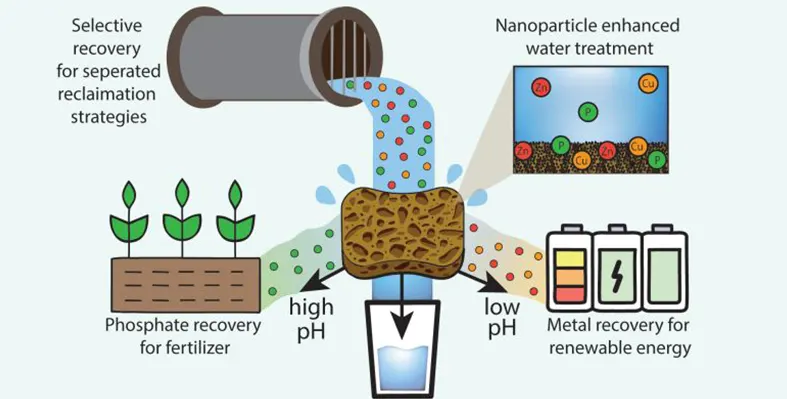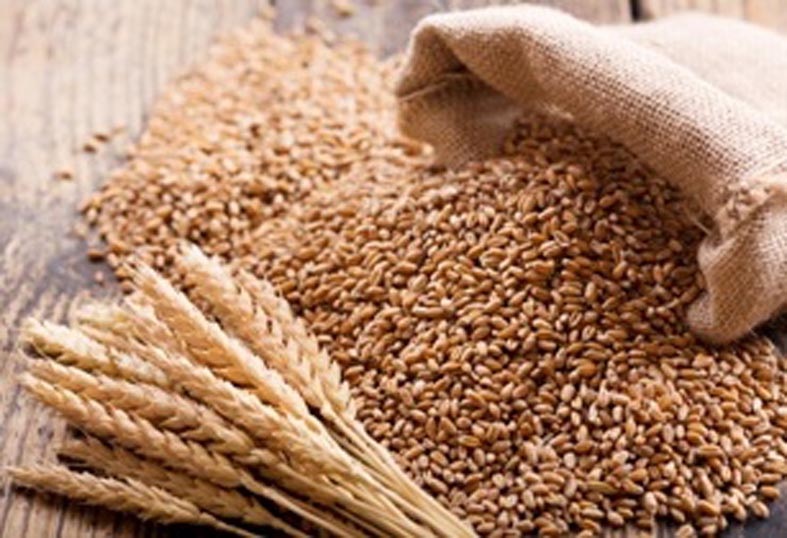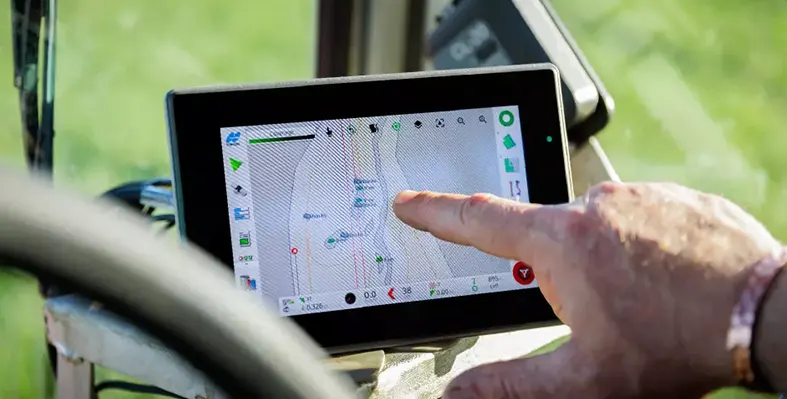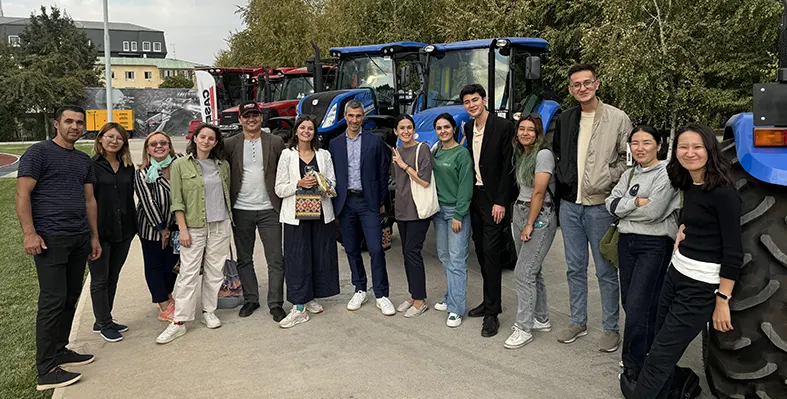Krone and Lemken, through a joint project, have launched a design concept – Combined Powers – which is an autonomous ‘process unit’ consisting of a drive unit and various implements
After passing trials in cultivating, ploughing, sowing, mowing, tedding and raking last year, the concept will be integrated in the well-proven forage harvesting and tillage systems of the two companies.
Using a diesel-electric drive that generates up to 170kW (230hp), the drive unit is designed to meet the power input requirements of the implements used in the processes above. The drive power is transferred electrically to the wheels and the pto and from there to the implement which couples to a three-point linkage. The drive unit boasts multiple and extensive sensor systems which monitor the immediate surroundings and the implement attached, ensuring safe operation and optimum results as the primary objectives. Operators control and monitor the combination from a mobile device, transmitting jobs and job reports via a communication module and the agrirouter, the established data exchange hub.
The specialty of the process unit is that it is controlled by the implement and not vice versa. This detail was considered imperative for achieving optimum results. The implement and the drive unit act as one integrated smart system. Based on the long experience in the application of ISOBUS and TIM on Krone and Lemken machines, the drive unit and implement communicate and interact, sharing literally all types of data.
The Combined Powers design concept also brings further benefits, because it was also developed to counter the increasing shortage of skilled labour in agriculture. Also, it will free farmers from spending those long days in the field. Instead, they will become system operators who merely monitor the process unit which delivers a consistently accurate quality of work. Thanks to its enormous versatility, the unit is designed for year-round work and a long service life. Intensive trialling in all types of conditions and seeking feedback from farmers and contractors will continue this year.
Further information is available at www.combined-powers.com
In The Spotlight
The regulatory agency in the Gash Barka area has held food safety workshops for people and animals, focusing on farmers and owners of organisations that provide social services in the sub-zones of Sel'a, Kerkebet, Laelai Gash, Gogni, and Mogolo
During the seminars, Meaze Neguse, an expert in animal resources regulation, cautioned that hazardous food could risk the lives of both people and animals. He stressed the importance of safety and hygiene throughout the whole food production chain, from farm to consumer, and emphasised the close relationship between food safety and environmental protection. He exhorted everyone involved in the food processing and distribution industry to work with regulatory professionals.
Hadish Gebremeskel, a representative of the plant regulatory service, spoke at length about the immediate and indirect negative consequences of misusing pesticides. He aimed at the serious implications of employing unauthorised or harmful agricultural medicines without consulting specialists, noting that these methods are bad for the environment, people, and animals. He requested farmers to switch to organic production methods and utilise only licensed pesticides.
Sub-zone officials, for their part, said that the seminars make a big difference in achieving the objective of "Ensuring Nutritious Food for All and Everywhere." They urged farmers and food processing companies to use the skills they acquired during the training in their regular activities.

The global phosphate fertilizer market is expected to grow upto US$84bn by 2031. (Image credit: Adobe Stock)
The phosphate fertilizers market is on a robust growth trajectory, anticipated to expand from US$57.5bn in 2024 to a significant US$84bn by 2031
This growth corresponds to a healthy compound annual growth rate (CAGR) of 5.6% during the forecast period from 2024 to 2031, according to the latest research. Phosphate fertilizers remain crucial for global agriculture, enhancing crop yields and soil fertility, thus playing a vital role in food security and sustainable farming practices worldwide.
Rising population levels, increasing food demand, and the need to improve agricultural productivity drive the expansion of phosphate fertilizer consumption. The market is segmented by product type, with single superphosphate (SSP) and triple superphosphate (TSP) being among the leading segments due to their efficiency and widespread adoption. Geographically, Asia Pacific dominates the market owing to extensive agricultural activities and supportive government policies encouraging fertilizer use.
The phosphate fertilizers market is pivotal in supporting global agriculture by providing essential nutrients that improve soil health and crop output. In 2024, the market value stood at US$57.5bn, expected to rise steadily to US$84bn by 2031, reflecting the growing need for sustainable and enhanced agricultural practices worldwide. The surge is driven largely by increased adoption in developing regions, where food production must keep pace with rising populations and changing dietary preferences.
Growth in the market is primarily fueled by the high demand from staple crops such as wheat, rice, and maize, which require phosphorus for optimal growth. Among different phosphate fertilizer types, single superphosphate holds a significant share due to its cost-effectiveness and suitability across diverse soil types. Regionally, the Asia Pacific market leads because of extensive farmland, large farming communities, and government incentives aimed at boosting fertilizer use to ensure food security and economic growth.

The programme emphasises a community-led approach, ensuring it is culturally relevant and sustainable. (Image credit: Adobe Stock)
BRAC has received a US$300,000 grant from The Rockefeller Foundation to create a programme aimed at helping three million women smallholder farmers in Bangladesh, Liberia, Tanzania, and Uganda by 2030
This initiative targets vulnerable communities affected by climate change. It will first launch in Bangladesh's coastal and drought-prone areas, providing farmers with services like agricultural technology, weather forecasts, adaptive insurance, and better market connections.
Deepali Khanna, head of Asia, The Rockefeller Foundation, stated,“Smallholder farmers are on the frontline of so many challenges, including the impact of climate change. Through our support of BRAC, we are empowering smallholder farmers not only to withstand disruptions, but also to advance solutions that can help build the foundation for lasting economic opportunity.”
The programme emphasises a community-led approach, ensuring it is culturally relevant and sustainable. The aim is to equip communities with skills to build resilience against challenges like rising salinity and erratic rainfall. BRAC plans to raise an additional US$300mn for this program, intending to impact around 14 million people positively.
“At BRAC, we believe in equipping people and communities with the skills they need to build their own resilience,” said Asif Saleh, executive director of BRAC. The Rockefeller Foundation’s support takes an important step in showing that locally driven innovation, when scaled up, can unlock pathways for millions of people to do that.”
-

HSW ECO MATIC® 6ml _ 10ml (for injection, oral and pour-on application)
Recently, the Meteorological Services Department of Zimbabwe (MSD), in partnership with Safe4All Africa and the Zimbabwe Farmers’ Union (ZFU), hosted a five-day workshop to address climate change and food insecurity challenges across Africa
Held in the wake of new weather station installations in Mashonaland East, the event brought together meteorologists, journalists, civil society groups, farmers, and other stakeholders for a focused dialogue on climate adaptation and early warning systems.
The workshop was a collaborative platform to share knowledge, promote climate-smart agricultural practices, and scale innovative technologies that enhance community resilience. Safe4All Africa, a non-governmental organisation founded in January 2024 and operating in Zimbabwe, Kenya, and Ghana, showcased several digital tools designed to help smallholder farmers manage climate risks.
Among the tools introduced were the Uliza-WI Chatbox, an AI chatbot providing localised forecasts and real-time farming advice; the Drop App, which tracks rainfall and sends drought alerts; the Climate Impact Atlas, an interactive platform highlighting high-risk climate zones; and a 24/7 Call Center Line, offering voice-based weather updates and expert support for farmers with limited internet access.
With Africa warming nearly twice the global average, and Zimbabwe increasingly vulnerable to droughts and shifting seasonal patterns, such innovations are crucial. Over 60% of Zimbabwe’s population relies on agriculture, making access to timely, localized climate data vital for national food security.
The Zimbabwe Farmers’ Union played a key role in ensuring farmer participation and emphasised the importance of local engagement. “We believe that technology must be rooted in local realities,” said Prince Kuipa, ZFU Operations Director. “By working closely with government agencies and tech innovators, we can ensure that smallholder farmers don’t get left behind in the climate conversation.”
MSD reaffirmed its commitment to expanding localized forecasting and early warning systems. These efforts align with Zimbabwe’s National Adaptation Plan and Vision 2030, the country’s strategy to achieve upper-middle-income status by the end of the decade.
The workshop concluded with a strong call for cross-sector collaboration to build inclusive, tech-enabled climate services that protect people and the planet.
Phileo by Lesaffre has announced that the European Food Safety Authority (EFSA) has published a positive scientific opinion on its probiotic product, Microsaf, confirming its efficacy and safety for poultry production
Microsaf is an innovative probiotic combining three Bacillus strains enhanced with GO Technology, which improves spore germination and efficiency. Designed to support digestive health and performance in broiler chickens, the product has now gained EFSA's backing as a zootechnical feed additive in the categories of 'gut flora stabilisers' and 'other zootechnical additives'.
Elen Rondel, Western Europe poultry manager at Phileo by Lesaffre, said, "We are thrilled to receive this positive EFSA opinion, which validates the efficacy and safety of Microsaf. Microsaf is a testament to our commitment to providing reliable, science-backed solutions that support animal health, performance and welfare."
She added, "Microsaf is the trademark for Phileo's innovative probiotic that combines three unique Bacillus strains in one product to address some of the key challenges faced by poultry producers today. Together, these novel strains have been proven to effectively support digestive performance in broilers, while simultaneously improving production profitability."
Microsaf has already been adopted globally, with producers reporting consistent improvements in feed conversion, gut health, and weight gain. "Over the past years, we have witnessed very positive adoption of Microsaf by customers globally. The feedback from producers has been exceptional, confirming the product's efficacy in real-world commercial settings," Rondel said. "We are excited to bring this proven solution to European poultry producers soon."
Pending final EU authorisation, Phileo is preparing for a European launch. "Microsaf represents our ongoing commitment to developing innovative solutions that help address the increasing complexity of food production while supporting animal health and welfare," Rondel concluded.

Zoomlion showcases tailored solutions for Africa’s growth at China-Africa Economic and Trade Expo. (Image source: Zoomlion)
Zoomlion Heavy Industry Science & Technology Co., Ltd. took centre stage at the 4th China-Africa Economic and Trade Expo in Changsha, China, from 12 to 15 June, showcasing its latest agricultural and engineering machinery solutions tailored specifically for the African market
Since making its entry into Africa in 2007, Zoomlion has played an integral role in infrastructure development and agricultural modernisation across the continent. The company has also been committed to nurturing local talent, evident in its ongoing technical training programmes, such as those provided to Ugandan farmers to enhance agricultural skill sets.
At the trade expo, Zoomlion displayed a comprehensive line-up of machinery, ranging from construction cranes and earthmoving equipment to aerial work platforms and advanced agricultural machinery. These products are engineered to withstand and perform efficiently in Africa’s diverse and often demanding working conditions.
Zoomlion’s footprint in Africa has expanded significantly over the past 18 years. The company has delivered more than 10,000 units of equipment to markets across the continent, establishing itself as one of Africa’s leading machinery suppliers. In addition to setting up subsidiaries in key markets like South Africa, Nigeria, Kenya, and Tanzania, Zoomlion has developed a robust after-sales infrastructure. This includes spare parts centres in Algeria and South Africa, a joint-venture manufacturing plant in Algeria, and an expanding network of dealers and service providers across the region.
The company has also been instrumental in supporting critical infrastructure projects throughout Africa. These include Egypt’s New Administrative Capital—home to Africa’s tallest skyscraper at 385.8 metres—the Julius Nyerere Hydropower Project in Tanzania, which boosts the country’s energy capacity nearly fourfold, and the N'Djamena Stadium in Chad, designed to host international sports and cultural events. Another notable contribution is the Rosso Bridge, linking Senegal and Mauritania, which will enhance regional trade and connectivity.
Zoomlion’s growth trajectory in Africa continues to accelerate. Sales in the first quarter of 2025 alone accounted for 60% of the total recorded in 2024, underlining rising demand for its solutions. As of May 2025, the company’s Africa team comprised over 300 employees, with more than 90% of them being locally hired—demonstrating Zoomlion’s commitment to job creation and skills development in the region.
Entocycle, a UK-based developer of insect farming technology that transforms food waste into sustainable protein for animal feed, has collaborated with Siemens to launch the country’s first digitalised insect farm showroom
The facility is uniquely located beneath four Victorian railway arches in central London.
Focused on creating a sustainable protein alternative, Entocycle chose the high-profile London Bridge area to boost visibility, attract top talent, and engage potential investors in its innovative approach to circular food systems.
Before construction began, Entocycle used Siemens’ digital twin technology to create a virtual model of the site. This simulation helped maximise the use of the complex arch-shaped space and minimise construction errors, saving time and costs.
The site has since undergone a full digital transformation and now runs on Siemens AI and automation systems. Advanced technologies integrated into the facility include robotic arms, machine vision systems that monitor 3,000 larvae per second with up to 100% accuracy, and climate-controlled chambers. These upgrades have significantly enhanced production by reducing larvae growth time and improving survival rates by 30%.
Now in operation for a year, the facility has demonstrated that insect farming can address two major environmental challenges: cutting the UK’s annual 10.7 million tonnes of food waste (of which 30% is lost through supply chain inefficiencies) and reducing reliance on 3.3 million tonnes of imported soy used for animal feed.
With proof of concept established, Entocycle plans to expand its model to industrial scale, aiming to support farms, agri-businesses, and waste management companies in cutting emissions and rethinking protein supply chains.
Matt Simonds, managing director at Entocycle, said: “We’ve spent a decade developing this concept, which has grown from equipment pieced together from hardware retailers to the bespoke and highly advanced factory we’re running today. The London Bridge centre proves our concept, which leverages the black soldier fly as nature’s recycler, that can be scaled around the world to help tackle the dual issue of food waste and sustainability issues in animal feed supply.
“Insect farming is an exciting emerging industry, and our vision is to be the go-to provider of technology to customers alongside our partner Siemens. In 10 years’ time, we expect Entocycle-designed farms to be processing millions of tonnes of food waste around the world, saving millions of tonnes of carbon emissions with it. Partnering with Siemens to deliver our solution internationally provides us with the trust and scalability we need to deliver on our global ambitions.”
Keith Thornhill, head of food and beverage for UK & Ireland at Siemens said: “Entocycle has created the blueprint for high-tech insect farming. It’s successfully applied modern manufacturing technology to its highly niche subject of rearing black soldier flies. And the outcomes are clear to see in increased insect survival rates and slashing the time staff would spend counting insects.
“It’s a fantastic concept ready to be delivered to customers around the world, regardless of site size and location. We’re proud to support it as a great example of technology with a purpose in addressing crucial sustainability challenges.”





